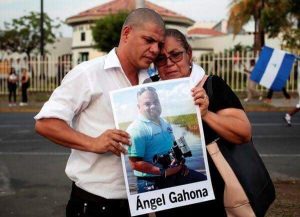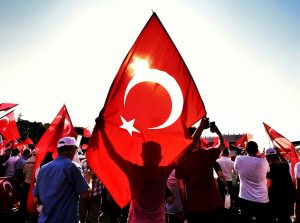By: Emma Bissell
Impunity Watch News Staff Writer
Nicaragua – The Inter American Commission of Human Rights concluded the State of Nicaragua liable for the murder of journalist Ángel Gahona López while he was covering a protest and urgently calls for their continued human rights violations to cease.
 |
On July 4th, 2024, The Inter-American Commission on Human Rights (The Commission) filed a case with the Inter American Court of Human Rights (IACHR) against Nicaragua concerning the execution of journalist Ángel Gahona López on April 21, 2018. The Commission concluded that the State of Nicaragua is responsible for violating Lopez’s rights to life and freedom of expression and concluded that the State failed to provide evidence to support the use of force against Lopez given the amplified and intense circumstances.
While covering protests against State violence in April 2018, Lopez was fatally shot. Although he did receive medical assistance from nearby civilians, witnesses reported that state officials present at the scene failed to provide any aid, further indicating that this was motivated by the state itself rather than being a random and unfortunate occurrence. Lopez died just a few hours later. The Merits Report indicated that a state agent was responsible for the murder and also indicated that the murder was linked to Lopez’s work as a journalist reporting on anti-government protests.
The Commission ultimately concluded that the State of Nicaragua violated the American Convention on Human Rights’ articles 4.1, 8.1, 13, and 25. These articles pertain to individuals having the right to an impartial hearing, freedom of thought and expression, to have their life respected, and the right to judicial protection.
Two young men were initially convicted of his murder but were released in 2019 under Law 966, which is also known as the amnesty law. This law was passed by the National Assembly of Nicaragua and intended to provide “broad amnesty” to all people who played a role in events throughout the country from April 18th, 2018, until the law entered force. This essentially applied to political crimes, and otherwise related crimes, which is why the two men were released. The Commission previously denounced this law on the grounds that it would exonerate those who committed grave human rights violations.
After finding the State of Nicaragua at fault, the Commission suggested that the State, in response to an array of human rights violations over the last 10 years, undertake reparations such as providing financial compensation to victims of human rights violations, conducting thorough investigations into matters such as Lopez’s death, and implementing protocols to prevent repetition of these ghastly acts.
The death of Ángel Gahona López was not an isolated incident. The State of Nicaragua has committed a lengthy series of human rights violations over the last several years. In fact, the Commission recently published a statement condemning the State for depriving its citizens of basic human rights and imprisoning many of them in appalling conditions. The Commission is not only calling upon the Nicaraguan government to cease its relentless persecution of human rights defenders but has also called upon the international community to provide support to those suffering at the hands of the government.
Unfortunately, as evidenced by the death of Ángel Gahona López, the plight of journalists in Nicaragua and other Central American countries, as well as internationally, is dire. In 2018 alone, there were 95 journalists killed on the job. Lopez’s death not only added to the number of journalists killed worldwide but is just one more example of the many heinous acts committed by the Nicaraguan government over the last decade.
For further information, please see:
IACHR – OAS – American Convention on Human Rights – 22 Nov. 1969
IACHR – OAS – Expresses Concern Over the Passing of Amnesty – 12 June 2019
IACHR – OAS – Files Case with IA Court Over Journalists Death and Ongoing Impunity in Nicaragua – 1 Oct. 2019
IFJ – In the Shadow of Violence; Journalists and Media Staff Killed in 2018 – 2019



